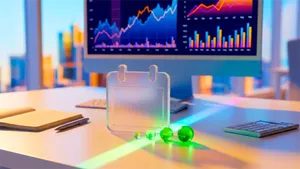Financial News
Saudi Arabia Biodegradable Plastic Market Trends & Forecasts 2025-2033 | Sustainability Goals, Government Policies, and Demand from Packaging and Agriculture Drive Adoption Bolster Growth - ResearchAndMarkets.com
The "Saudi Arabia Biodegradable Plastic Market Trends & Forecast 2025-2033" report has been added to ResearchAndMarkets.com's offering.
The Saudi Arabia Biodegradable Plastic Market is expected to reach US$ 221.98 million by 2033 from US$ 78.65 million in 2024, with a CAGR of 12.22% from 2025 to 2033. Environmental concerns that support bioplastics as an alternative to single-use plastic are a significant driver of the market under study. Furthermore, the market's expansion is probably going to be impacted by the rising demand for packaging.
The market for biodegradable plastic in Saudi Arabia is mostly focused in large cities like Riyadh, Jeddah, and Dammam, where consumer demand, government programs, and industrial infrastructure propel adoption and expansion.
Saudi Arabia's biodegradable plastics sector is gradually changing as the nation places a greater emphasis on environmental preservation and sustainable growth. Interest in biodegradable alternatives has increased as a result of growing worries about plastic pollution and the negative impacts of conventional plastics. In order to satisfy growing environmental restrictions and consumer demand for greener products, industries like packaging, agriculture, and consumer goods are looking for eco-friendly materials more and more. This change is encouraging innovation in manufacturing techniques and material science, which makes it possible to develop and market a variety of biodegradable plastics with a range of uses.
The Saudi Arabian regulatory landscape significantly influences the market for biodegradable plastics. To cut down on plastic waste and promote the use of sustainable materials, the government has implemented policies. In order to guarantee product quality and environmental compliance, standards and certifications pertaining to biodegradability and compostability are being created and implemented.
Furthermore, national strategic initiatives support recycling and waste management techniques that are in line with international sustainability goals by highlighting the concepts of the circular economy. Working together, government agencies, academic institutions, and businesses in the private sector can propel technological improvements and commercial expansion.
Notwithstanding encouraging advancements, the sector still confronts obstacles that may prevent its broad acceptance. When compared to conventional plastics, biodegradable plastics are less competitive due to high manufacturing costs and restricted raw material availability. End-of-life management for biodegradable materials is hampered by the lack of infrastructure for industrial composting and waste processing. Even though they are becoming better, market awareness and consumer acceptance still need constant outreach and education.
In Saudi Arabia's quest for a more sustainable future, overcoming these obstacles by sustained innovation, investment, and policy support will be essential to maximizing the potential of biodegradable plastics.
Key Factors Driving the Saudi Arabia Biodegradable Plastic Market Growth
Objectives for Sustainability and Environmental Awareness
Public awareness of the harm that plastic pollution causes to ecosystems and human health has increased due to growing environmental concerns both domestically and internationally, including in Saudi Arabia. Customers, companies, and legislators are being inspired by this understanding to look for sustainable substitutes for traditional plastics. This tendency is supported by the Kingdom's strong commitment to environmental sustainability, which is expressed in its Vision 2030 and associated national efforts.
These initiatives provide a strong emphasis on cutting waste, encouraging resource efficiency, and implementing greener materials in a variety of industries. Biodegradable plastics are therefore becoming more and more recognized as a practical way to reduce plastic pollution. This mentality change - from conventional plastics to eco-friendly substitutes - is a major factor propelling industry expansion by motivating producers to make investments in sustainable production and consumers to choose ecologically friendly goods.
Rules and Policies of the Government
The adoption of biodegradable plastics in Saudi Arabia is mostly influenced by governmental regulations and policies. In an effort to reduce environmental pollution, authorities have implemented more stringent regulations that restrict the use of typical single-use plastics. Standards and certification programs intended to guarantee the quality and biodegradability of products entering the market are used in conjunction with these regulations.
The government also offers incentives to companies and manufacturers who use sustainable alternatives in their packaging and goods. Industry participants are encouraged to innovate and embrace green materials as a result of this regulatory support, which improves the environment for biodegradable plastics. When combined, these actions quicken the transition to environmentally friendly plastics in a variety of industries, supporting long-term market expansion.
Growing Demand in Agriculture and Packaging
Due to changing customer tastes and environmental concerns, Saudi Arabia's packaging and agricultural industries are among the top users of biodegradable plastics. Biodegradable materials in packaging provide a practical substitute for single-use items such as food wraps, bags, and containers, lowering plastic waste and enhancing sustainability credentials.
Similar to this, biodegradable mulch films, plant pots, and other items in agriculture aid in lowering soil pollution and the problems with waste management that come with using conventional plastics. The growing demand for biodegradable plastics is supported by these sectors' heightened emphasis on sustainable practices and the concepts of the circular economy. As producers and consumers realize the materials' advantages for the environment and regulations, this trend is greatly boosting the market's growth.
Challenges in the Saudi Arabia Biodegradable Plastic Market
Consumer education and market awareness
Although there is growing interest in biodegradable plastics in Saudi Arabia, a major obstacle to market expansion is still the lack of knowledge among businesses and customers regarding their advantages and their application. The environmental benefits of biodegradable plastics and the significance of appropriate disposal techniques like industrial composting are two things that many end users are unaware of. The environmental impact may be compromised by overuse or disposal in ordinary waste streams as a result of this ignorance.
Without precise data on the cost and performance advantages, companies would also be reluctant to choose biodegradable substitutes. Targeted education campaigns, stakeholder engagement, and open communication regarding the benefits of the product and disposal instructions are crucial for overcoming these obstacles. Raising awareness will encourage broader use of biodegradable plastics and increase consumer confidence.
Complexity of Regulation and Certification
Saudi Arabia's biodegradable plastics regulations are changing, but manufacturers face difficulties navigating new terrain. It takes a significant amount of time, paperwork, and testing to obtain the certifications required to prove biodegradability and compliance with national regulations. These procedures can be expensive, especially for startups or smaller businesses, which delays the introduction of cutting-edge goods.
Additionally, producers might have to satisfy several regional criteria due to the absence of standardized worldwide standards, which would make exporting and scaling more difficult. Regulations that are updated or changed frequently increase operating difficulties and uncertainty. To speed up product approvals and promote market expansion, regulatory processes must be streamlined and industry stakeholders must receive clear direction and assistance.
Company Analysis (Overview, Key Persons, Recent Developments, SWOT Analysis, Revenue Analysis)
- Total Corbion
- Mitsubishi Chemical Holding Corporation
- Toray Industries
- BASF SE
- Green Dot Bioplastics
- Amcor Limited
Key Attributes:
| Report Attribute | Details |
| No. of Pages | 200 |
| Forecast Period | 2024 - 2033 |
| Estimated Market Value (USD) in 2024 | $78.65 Million |
| Forecasted Market Value (USD) by 2033 | $221.98 Million |
| Compound Annual Growth Rate | 12.2% |
| Regions Covered | Saudi Arabia |
Key Topics Covered:
1. Introduction
2. Research & Methodology
2.1 Data Source
2.2 Research Approach
2.3 Forecast Projection Methodology
3. Executive Summary
4. Market Dynamics
4.1 Growth Drivers
4.2 Challenges
5. Saudi Arabia Biodegradable Plastic Market
5.1 Historical Market Trends
5.2 Market Forecast
6. Share Analysis
6.1 Market Share
6.1.1 By Material Type
6.1.2 By Application
6.1.3 By States
6.2 Volume Share
6.2.1 By Material Type
7. Material Type
7.1 Polybutylene adipate Terephthalate (PBAT)
7.1.1 Market
7.1.1.1 Market Analysis
7.1.1.2 Market Size & Forecast
7.1.2 Volume
7.1.2.1 Volume Analysis
7.1.2.2 Volume Size & Forecast
7.2 Polybutylene Succinate (PBS)
7.3 Polylactic Acid (PLA)
7.4 Polyhydroxyalkanoate (PHA)
7.5 Starch Blends
7.6 Others
8. Applications Market
8.1 Packaging
8.1.1 Market Analysis
8.1.2 Market Size & Forecast
8.2 Agriculture
8.3 Consumer Goods
8.4 Others
9. Top States
9.1 Dhahran
9.1.1 Market Analysis
9.1.2 Market Size & Forecast
9.2 Riyadh
9.3 Khobar
9.4 Jeddah
9.5 Dammam
9.6 Others
10. Value Chain Analysis
11. Porter's Five Forces Analysis
11.1 Bargaining Power of Buyers
11.2 Bargaining Power of Suppliers
11.3 Degree of Competition
11.4 Threat of New Entrants
11.5 Threat of Substitutes
12. SWOT Analysis
12.1 Strength
12.2 Weakness
12.3 Opportunity
12.4 Threats
13. Pricing Benchmark Analysis
13.1 Total Corbion
13.2 Mitsubishi Chemical Holding Corporation
13.3 Toray Industries
13.4 BASF SE
13.5 Green Dot Bioplastics
13.6 Amcor Limited
14. Key Players Analysis
For more information about this report visit https://www.researchandmarkets.com/r/kx3jts
About ResearchAndMarkets.com
ResearchAndMarkets.com is the world's leading source for international market research reports and market data. We provide you with the latest data on international and regional markets, key industries, the top companies, new products and the latest trends.
View source version on businesswire.com: https://www.businesswire.com/news/home/20250822342822/en/
Contacts
ResearchAndMarkets.com
Laura Wood, Senior Press Manager
press@researchandmarkets.com
For E.S.T Office Hours Call 1-917-300-0470
For U.S./ CAN Toll Free Call 1-800-526-8630
For GMT Office Hours Call +353-1-416-8900
More News
View More




Recent Quotes
View MoreQuotes delayed at least 20 minutes.
By accessing this page, you agree to the Privacy Policy and Terms Of Service.



